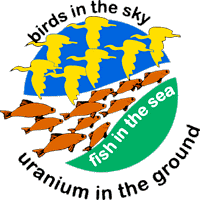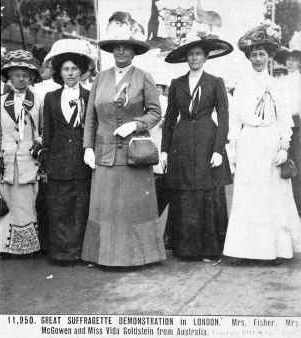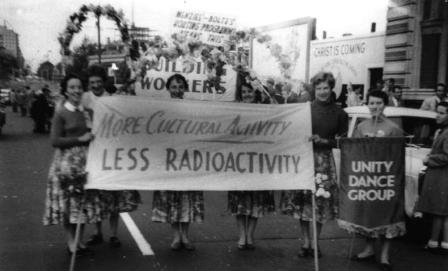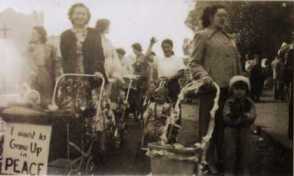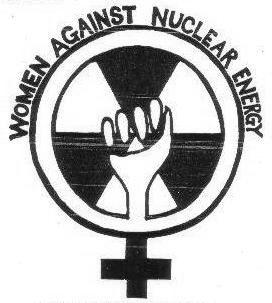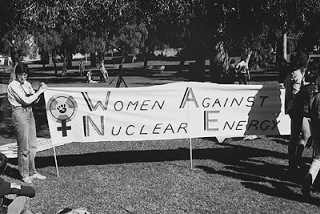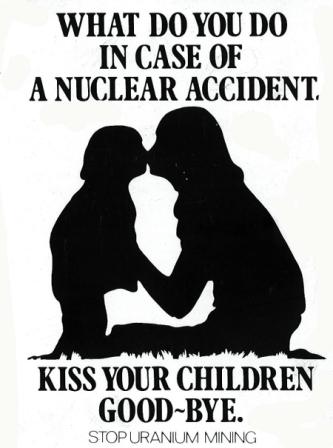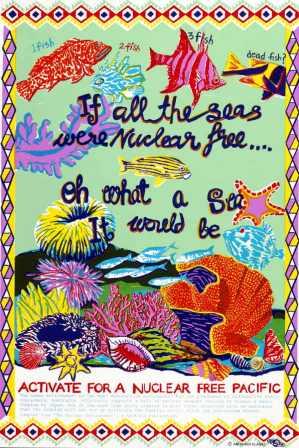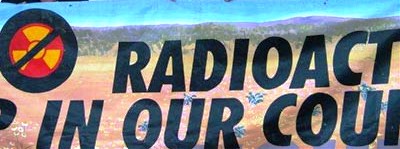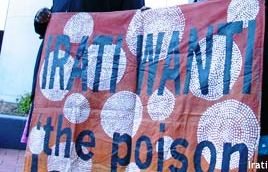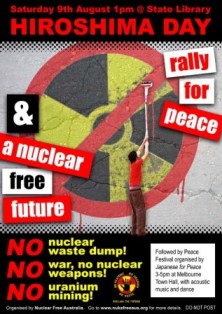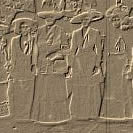 |
WOMEN WORKING TOGETHER |
THIS SITE CONTAINS
1 to 5 - Winning the vote
Chapter 1: The Vote or Bust 1788-1908
Chapter 2: Who Were the Suffragists?Chapter 3: 'United and Representative Agitation'
Chapter 4: Anti-Suffragists 1900-1910Chapter 5: Onwards to Success 1884-1908
6 to 10 - Social Justice and peace
Chapter 6: Moving into the Public World
Chapter 7: 1914-18 War - Pro Peace, Pro and Anti War
Chapter 8: Women's Work in WW1
Chapter 9: 1919-1935 - Surviving
Chapter 10: 1935-1945 Still Surviving
11 to 15 - Finding our voice as women
Chapter 11: 1945 and after - In Our Own Right
Chapter 12: 1970's Protesting - Working Together Again
Chapter 13: Finding Our Voice - Women's Liberation
Chapter 14: Working Collectively
Chapter 15: The 1970's & 80's Broader Women's Movement
16 to 20 - Our legacy our strength our struggle
Chapter 16: In Our Own Hands - Our Bodies
Chapter 17: Whose Right to Choose?- Our Selves
Chapter 18: Environment Matters
Chapter 19: 1990's When the Women's Movement is Quiet
Chapter 20: What a Legacy We Inherit!
Appendix 1: Papers and Interviews
Appendix 2: Songs from the Women's Movement
WOMEN FROM THE
WOMEN'S MOVEMENT
MENTIONED IN THIS WORK.
Abigail Adams
Ada Brougham
Adela Pankhurst
Adrian Howe
Agnes Murphy
Aileen Goldstein
Ailsa O'Connor
Alayne Park
Alex Butler
Alice B Toklas
Alice Henry
Alice Moon
Alice Suter
Alice Walker
Alice Weekes
Alina Holgate
Alisa Burns
Alison Alexander
Alison Dickie
Alison Richards
Alix McDonald
Alma Morton
Alma Thorpe
Andrea Coote
Annie McKenzie
Alva Geike
Amanda Bede
Amanda Biles
Amanda Graham
Amelia Ceranas
Amelia Lambrick
Amira Ingliss
Amy Castilla
Angelina Austin
Angelina Wonga
Ann Jackson
Anna Brennan
Anna Howie
Anna Morgan
Anna Pha
Anna Shaw
Anna Stewart
Anne Barker
Anne Carson
Anne Conlon
Anne Gowers
Anne Phelan
Anne Riseborough
Anne Stewart
Anne Summers
Annette Bear-Crawford
Annie Lister
Annie Lowe
Annie McKenzie
Anthea Hyslop
Antonie Stolle
Ariel Couchman
Audrey Oldfield
Barb Friday
Barbara Creed
Barbara Hall
Barbara Jones
Barbara Kerr
Barbara Marsh
Barbara Van Meurs
Barbara Wishart
Beatrice Faust
Bella Lavender
Belle McKenzie
Bertha Main
Beryl Carter
Bessie Harrison-Lee
Bessie Rainer Parkes
Bessie Rischbieth
Bette Olle
Betty Richmond
Bev Kingston
Bon Hull
Brettena Smyth
Brienne Callahan
Brigid McCaughey
Bronwyn Pike
Candy Broad
Carmel Shute
Carmen Callil
Carmen Lawrence
Carole Ford
Carole Wilson
Caroline Huidobro
Caroline Landale
Carolyn Allport
Carolyn Jay
Carolyn Worth
Carrie Chapman Catt
Carrie Reed
Caryl Friedman
Cath Mayes
Cath Stone
Catherine Anne Spence
Catherine Blackburn
Catherine McLennan
Cecilia John
Charlotte P Gilman (Stetson)
Cheris Kramarae
Cheryl Griffin
Chris Cathie
Chris Chapman
Chris Sitka
Chris Zsizsman
Christina Frankland
Christina Stead
Christine Haag
Churls Kramarae
Claire Berry
Clara Weekes
Clare Wright
Claudia Wright
Colleen Hartland
Constance Stone
Cynthis Carson
Dale Dowse
Dale Spender
Daphne Gollan
Deb Schnookal
Deborah Jordan
Deborah Wardley
Di Fruin
Di Otto
Di Surgey
Diane Crunden
Diane Kirby
Diane Sonnenberg
Dianne Edwards
Dianne Scott
Dianne Wells
Dimity Reed
Divna Devic
Dominica Whelan
Dora Coates
Doris Blackburn
Doris Challis
Doris McRae
Dorothy Turner
Dr Adrian Howe
Dr Aletta Jacobs
Dr Clara Stone
Dr Clare Isbister
Dr Constance Stone
Dr Helene Stocker
Dr Georgina Sweet
Dr Gwen Fong
Dr Janet Bacon
Dr Jocelynne Scutt
Dr Lyn McKenzie
Dr Marie Stopes
Dr Mary Glowrey
Dr Mary Stone
Dr Tamara McKean
Duggie Silins
Edie Turnevich
Edith Hedger
Edith Morgan
Edith Taylor
Edna Ryan
Eileen Capocchi
Eileen Kampukuta Brown
Eileen Unkari Crombie
Eleanor Dark
Eleanor Harding
Eleanor Hobbs
Eleanor M Moore
Elizabeth Cady Stanton
Elizabeth Coady
Elizabeth Hooke
Elizabeth Jackson
Elizabeth Ramsay-Laye
Elizabeth Reid
Elizabeth Rennick
Elizabeth Wallace
Elizabeth Wheelahan
Elizabeth Windshuttle
Ellen Julia Gould
Ellen Kleimaker
Ellen Ward
Elphinstone Dick
E McAllister
Emily Dobson
Emily Greene Balch
Emily Munyungka Austin
Emily Pankhurst
Emmaline Pankhurst
Emmy Evald
Ethel Barringer
Eugenie Davidson
Eva Eden
Eva Cox
Eva Figes
Eve Fesl
Eve Gray
Evelyn Gough
Evelyn Greig
Farley Kelly
Fiona Colin
Fiona Moorhead
Fleur Finney
Flo Kennedy
Flora Eldershaw
Florence Kelly
Frances Fraser
Frances Kissling
Fraulein Von Heymann
Freda Durham
Freda Gamble
Freda Steinberg
Frida Kahlo
Florence Miller
Gay Harris
Gayle Tierney
Gaylene Sneadon
Geraldine Briggs
Geraldine Robertson
Georgina McEnroe
Germaine Greer
Gertrude Bussey
Gertrude Stein
Gill Alecto
Gillian Waite
Gina Lewis
Gisela Kaplan
Glen Tomasetti
Greta Pearce
Gudren Drewsen
Gwendolen Swinburne
Harriet Taylor Mill
Hazel Donelly
Heather Jeffcoat
Heather Osland
Helen Anderson
Helen Caldicott
Helen Dow
Helen Durham
Helen Palmer
Helen Reddy
Helen Robertson
Helen Shardey
Helen Sexton
Hellen Cooke
Henrietta Dugdale
Henry Handel Richardson
Hetty Gilbert
Ilka Elkemann
Ina Higgins
Irina Dunn
Isabel McCorkindale
Isabella Goldstein
Isabella Martinis
Ivy Makinta Stewart
Jaala Pulford
Jacinta Allen
Jackie Fristacky
Jacqui Katona
Jan Armstrong Cohn
Jan Bassett
Jan Harper
Jan Mercer
Jan Testro
Jane Addams
Jane Alley
Jane Greig
Jane Mullett
Janet Bacon
Janet Bell
Janet Elefmiotis
Janet Lindsay Greig
Janet McCalman
Janet Michie
Janet Strong
Janey Stone
Janice Brownfoot
Janice Munt
Janine Bourke
Janne Reed
Jean Bedford
Jean Daley
Jean Henry
Jean McLean
Jean Melzer
Jean Sims
Jean Taylor
Jean Thompson
Jeanette Fenelon
Jeanette Powell
Jeanette Rankin
Jeni Thornley
Jennifer Clark
Jennifer Feeney
Jennifer Lee
Jennie Baines
Jenny Bacon
Jenny Barwell
Jenny Lee
Jenny Mikakos
Jenny Rimmer
Jenny Tatchell
Jesse Marlow
Jessie Ferguson
Jessie Henderson
Jessie Mcleod
Jessie Street
Jenny Pausaker
Jessie Street
Jessie Taylor
Jill Jolliffe
Jill Parkes
Jill Reichstein
Jill Roe
Jo Ellis
Jo MacLaine-Cross
Jo Phillips
Jo Wainer
Joan Coxsedge
Joan Curlewis
Joan E Basquil
Joan Goodwin
Joan Elkington
Joan King
Joan Kirner
Joan Rosanove
Joan Rowlands
Joanna Rea
Joanne Duncan
Jocelyne Clarke
Joe Dolce
Josephine Butler
Josie Lee
Joy Damousi
Joyce Barry
Joyce Johnson
Joyce Nicholson
Joyce Stevens
Jude Perera
Judi Willis
Judith Smart
Judy Cassar
Judy Morton
Judy Power
Judy Maddigan
Judy Small
Julia Church
Julia So So
Julianne Fogarty
Julie McCrossin
Julie Shiels
Juliette Mitchell
Kamla Bhasin
Karen Bird
Karen Gillespie
Karen Milgram
Karen Overington
Karen Silkwood
Karina Veal
Kate Darian-Smith
Kate Gilmore
Kate Jennings
Kate Miller
Kath Williams
Katherine Mansfield
Katherine Suzannah Prichard
Kathie Gleeson
Kathie Sarachild
Kathleen Fitzpatrick
Kathleen Maltzahn
Kathryn Sutherland
Kathy Gill
Kathy Wilson
Katrina Veal
Kay Daniels
Kaye Darveniza
Kay Hamilton
Kay Hargreaves
Kay Setches
Kaz Cooke
Keitha Carter
Kerry Blundell
Kerryn & Jenny
Kris Wilkinson
Lady Helen Munro-Ferguson
Lariane Fonseca
Laura Daniele
Laura Van Nooten
Laurie Bebbington
Lena McEwan
Lesbia Harford
Lesley Hewitt
Lesley Podesta
Lesley Stern
Lesley Vick
Leslie Cannold
Leslie Henderson
Lexie Methereall
Libby Brook
Libby Minifie
Lilian Alexander
Lilian Wald
Lily D'Ambrosia
Linda Aarchen
Linda Rubenstein
Linn Van Hek
Lisa Neville
Lisa Shuckroon
Liz Beattie
Liz Byrski
Liz Dowling
Liz Taylor
Lois Bryson
Lois Young
Lorri Manning
Louisa Lawson
Louisa Remedios
Louise Asher
Louise Walford
Lorna Scarles
Lucy Kowing Wilton
Lucy Paling
Lydia Becker
Lyla Barnard
Lyn Chambers
Lyn Hovey
Lyn McKenzie
Lynne Kosky
Mabel Drummond
Mandy Paul
Maree Gladwin
Margaret Bevege
Margaret Baskerville
Margaret Geddes
Margaret James
Margaret Mead
Margaret McKenzie
Margaret McLean
Margaret Roadknight
Margaret Thorp
Margaret Tims
Margaret Tucker
Margot Oliver
Maree Gould
Maria Mies
Marian Sawer
Marian Simms
Marian Vickers
Marie Kirk
Marie McInnes
Marie Rowan
Marion Harper
Marilyn Beaumont
Marilyn Hillgrave
Marilyn Lake
Marsha Thomson
Marylin Waring
Marilyn Wise
Marj Oke
Marjorie Barnard
Marjorie Barrett
Marjorie Waters
Mary Astell
Mary Bartlett
Mary Brodney
Mary Crooks
Mary Fullerton
Mary Gilbert
Mary Grant
Mary Killury
Mary Leigh
Mary Merkenich
Mary Murnane
Mary Owen
Mary Page Stone
Mary Rogers
Mary Salce
Mary Wolstonecraft
Mary Wooldridge
Matron Brown
Maxine Morand
May Brodney
May Langbridge
May Scheidt
May Smith
Megan McMurchy
Melanie Hall
Melinda Freyer
Melvina Ingram
Meredith Tax
Mesdames: Wallace; Baines;
Lavender; Webb; Singleton;
Morris; Gardiner; Reynolds,
Reid.
Mesdames Savage and Bella Lavender
Miles Franklin
Millicent Garrett Fawcett
Miss A Hume
Miss Anderson
Miss C H Thomson
Miss Cuthbertson
Miss D McRae
Miss E Goldstein
Miss E Hedger
Miss Effie Smart
Miss E Nesbit
Miss Geraldine Rede
Miss H Bridger
Miss H McGowan
Miss Harriet Newcomb
Miss Hilda Moody
Miss Jane Adams
Miss Janet Michie
Miss Jeanette Rankin
Miss Judd
Miss L Savage
Miss Lawler
Miss Lillian Locke
Miss Lillian Wald
Miss Mary Fullerton
Miss Miriam Geach
Miss Olive Gray
Miss R Smethurst
Miss Rapier
Miss Selina Cooper
Miss Simmons
Miss Wollen
Miss Stoddart
Miss V Bonner
Misses: Lewis; McMahon; Helsby;
Moody; Wise; Pascoe; Stewart;
Goodwin; Grant etc.
Misses: Mulcahy; Delaney; Townsend;
McGrath; Clements; Collins; Triffle; Cohen; McLean
Moira Rayner
Mollie Baine
Mollie Dyer
Molly Hadfield
Monika Wells
Morag Loh
Madame E Lorton Campbel
Mrs Anna B Howie
Mrs Bella Lavender Halloran
Mrs Beresford Jones
Mrs Bochinon
Mrs Brown
Mrs Catherine P Wallace
Mrs Chesterfield
Mrs Crawford
Mrs Crutchfield
Mrs D Irwin
Mrs D Monsbourgh
Mrs D Nankivell
Mrs Dwyer
Mrs E Hampton
Mrs E M Nimmo
Mrs E Pethridge
Mrs E Rothfield
Mrs Elliot
Mrs E W Nicholls
Mrs Emily Jackson
Mrs Evelyn Gough
Mrs F J Nicholls
Mrs F Williams
Mrs Florence Kelly
Mrs Fryer
Mrs Fisher
Mrs G Cameron
Mrs Goldstein (senior)
Mrs H A Dugdale
Mrs Harrard
Mrs Harrison Lee
Mrs Jamieson
Mrs Janet Strong
Mrs Jessie Vasey
Mrs Joan Rosanove
Mrs Josephine Butler
Mrs Kelly
Mrs Langdale
Mrs Laura Howie
Mrs Lister Watson
Mrs Lowe
Mrs Lucy Paling
Mrs M Hartley
Mrs M B Wollaston
Mrs M Mayall
Mrs Mabel Drummond
Mrs Malcolm
Mrs Martin
Mrs Mary Baird
Mrs Maudsley
Mrs M McGowan
Mrs Moody
Mrs Moore
Mrs Nance Wills
Mrs Naylor
Mrs O'Dowd
Mrs P Eden
Mrs Press
Mrs Pymm
Mrs Renwick
Mrs Robertson
Mrs Rosanov
'Mum' Shirl
Mrs Singleton
Mrs Smythe
Mrs Steele
Mrs Strong
Mrs Warren Kerr
Mrs Z Lees
Muriel Heagney
Myra Roper
Nan Chelsworth
Nancy Kessing
Nancye Smith
Narelle Dwyer
Nawal El Saadawi
Nettie Palmer
Nicole Steinke
Nina Bondarenke
Norma Grieve
Olive Gray
Olive Schreiner
Onnie Wilson
Pam Brewster
Pam Roberts
Pamela Branas
Pamela Curr
Pat Freeman
Pat Gowland
Pat Martin
Patricia Filar
Patsy Adam-Smith
Paula Trechler
Pauline Kennedy
Pauline Pickford
Peggy Cullinan
Penny Cooke
Penny Farrer
Penny Ryan
Peta Tait
Petra Munro
Philippa Hawker
Ponch Hawkes
Prof. Jo Wainer
Prof. Margaret Thornton
Rachel Avery
Rachel Hesley
Rae Walker
Raelene Frances
Ramona Koval
Rebecca West
Renate Howe
Renate Klein
Renee Miller
Renee Romeril
Rhoda Bell
Rigmor Berg
Rivka Pile
Roberta Meilleur
Robin Morgan
Robin Royce
Robyn Archer
Robyn Martin
Robyn Rowland
Romawati Senaga
Ros Bowden
Rose Scott
Rosemarie Gillespie
Rosemary Brown
Rosie Ferber
Ruby Rich
Ruby Tuesday
Ruth Bermann
Ruth Crow
Ruth Ford
Ruth Schnookal
Sabine Fernheicher
Sadie Kirsner
Sally Mendes
Sally Wilkins
Sandra Bloodworth
Sandra Onus
Senator Olive Zakharov
Sharon Jones
Sheila Bayard
Sheila Ricci
Sheila Wynn
Shirley Andrews
Shirley Swain
Sister Gladys Sumner
Sister Blake
Sister Brown
Sister Hannah
Sophie Slater
Stephanie Moore
Sue Jackson
Sue Mountford
Sue Pennicuik
Sue Reid
Sue Russell
Susan Anthony
Susan Hawthorne
Susie Grezik
Susy Potter
Suzane Fabian
Sylvia Azzopardi
Sylvia Plath
Sylvie Leber
Sylvie Shaw
Tammy Lobato
Tanya McIntyre
Teresa Magna
Terri Jackson
Terry Carney
Tess Lee-Ack
Tess Maloney
Thelma Fry
Thelma Lees
Thelma Prior
Thelma Solomon
Therese Radic
Theresa Lynch
Tjunmutja Myra Watson
Tjuta Ivy Makinti Stewart
Tracey Gurd
Tricia Caswell
Tricia Szirom
Trish Crick
Trudy Wise
Una Stannard
Val Ogden
Val Osborne
Vandana Shiva
Verity Bergmann
Vweronica Shwarz
Vida Goldstein
Virginia Geddes
Virginia Woolf
Vivien Brophy
Vivienne Binns
Wendy Lovell
Wendy Lowenstein
Wendy Poussard
Win Graham
Winsome McCaughey
Yolana Sutherland
Yosano Akiko
Yvonne Margarula
Yvonne Smith
Zara Wildenaur
Zelda D'Aprano
Zoe PhillipsThis work is copyright.
Please acknowledge the source/sources of anything you use.Every effort has been made to trace the people used on this site. Please contact us if you have any questions or concerns about our use of material.
Website advice:
Jean McConnachie
Editorial advice:
Barbara Hall, also Apsara Sabaratnam, Jean McConnachie, Irene Stavrakakis, Margaret Allison, Ramona Audrey, Waratah Rose Gillespie
Legal advice:
Matthew Nicholls
The forthcoming book is funded by Women's Web members and associates: Barbara Hall, Geraldine Robertson, Mary Crooks, Zelda D'Aprano
If you would like to contribute, please contact us.
CHAPTER 18: Environment Matters - Caring for Country'Whatever happens,
like the women of Greenham Common we must continue to work for a better world.'
Joan Coxsedge
In this chapter we look at women in the anti nuclear movement
1...1950'S PEACE DEMONSTRATIONS
2...WOMEN AND THE ENVIRONMENTAL CRISIS
3...WOMEN'S INTERNAIONAL LEAGUE FOR PEACE AND FREEDOM (WILPF) French Bomb Testing in the Pacific 1972
4...1978 FEMINIST STRATEGIES
5...WHY WOMEN ONLY? and the campaigns
6...1978 FEMINISM AND URANIUM CONFERENCE Melbourne
7...WOMEN AGAINST NUCLEAR ENERGY (WANE)
8...WOMEN'S PEACE PICNIC also
9...WOMEN 'ACT' AGAINST PINE GAP
10...WOMEN FOR SURVIVAL with11..THE WHOLE ROTTEN PINE GAP DEAL
12..THE CLEAN UP leading to
13.. PINE GAP CRUSADERS ARRESTED anD
14..1983 NON VIOLENCE AND DIRECT ACTION the
15..1984 - COCKBURN SOUND the .
16..US CONSULATE VIGIL
17..WOMEN FOR SURVIVAL Text from Badges
18..MIRRAR WOMENWe end with
19.. OPEN LETTER FROM THE KUPA PITI KUNGKA TJUT
20..THE POISON - LEAVE IT1...1950'S PEACE DEMONSTRATIONS
moz-screenshot.jpgZara Wildernaur: 'This picture was taken at a WILPF demonstration when I was visiting a friend in Melbourne in 1953. We still have religious and ethnic hatred and war, why? I believe most people want to live a peaceful life, but they don't have the structures to work through, such as, for example, a Department of Harmony. Not that, necessarily, but something similar.' Older Person's Action Centre 2004 from Women's Web www.womensweb.com.au
'I want to grow up in peace' Private Papers with thanks to Zara Wildenaur
Zara Wildenaur:'I am on the left behind the pram holding my son and the peace sign.2...WOMEN AND THE ENVIRONMENTAL CRISIS
Nan Chelsworth: 'It is apparent that the human species is in danger of extinction if no measures are taken to reverse not only environmental destruction, but also the destruction of society ... Women have restricted themselves to the intensive care of husband and family for too long and this is suddenly no longer ethical, much less sane ...
It is time for all organised groups to incorporate protection of the environment in their objectives. Since both the liberation of women and the rescue of the environment are essentially freedom oriented, pro-life movements, they are inevitably inter-related. The one is negated without the other, since the earth is doomed while half the population remains inert in synthetic and inherently destructive roles, and the liberation of women will prove rather futile if the species is to wipe itself out.' 1971? Ruth Berman papers University of Melbourne
Women's Liberation Newsletter 1975: 'Ecology - Friends of the Earth - Glen Tomasetti read out a long letter urging women to support the fight against the environmental crisis, particularly the recent uranium agreement. There's to be a Bike Ride Against Uranium leaving Melbourne for Canberra on Sat 10th May to call MP's to account on uranium deals which, like the commitment of soldiers to Viet Nam, are of doubtful legality under the Governments' own Acts, and to demand research into alternative safe sources of energy.' Marie Rowan papers University of Melbourne
Zoe Sofoulis: 'Progress, Patriarchs and Nuclear Power, Sexist ideology and the environmental crisis - The term "patrirchy" refers here to the social order where men are regarded as "heads" of the family and where political and economic power rest in the hands of a male elite. "Patriarchal consciousness" refers to the dualistic way our civilization has regarded the world, valuing but one pole of the perceived dualism over the other, eg man over woman, mind over body, logic over feelings, culture over nature ... Women are oppressed not simply by men but by the assumptions of patriarchal consciousness which we have internalized. Our oppression by sexism, and the earth's oppression by the results of "Progress" have common root in the alienated experience of self and world upon which patriarchal civilization is founded, an experience which was used to justify Man setting himself up as lord over nature and women ...' Vashti Autumn/Winter '78 Zelda D'Aprano papers University of Melbourne
Helen Caldicott: 'When I speak to a general audience about nuclear war it's the women who move immediately. You can see the women who have never even heard of liberation suddenly become tremendously powerful'.Nan Chelsworth: 'Women and the Environmental Crisis - ... Women have restricted themselves to the intensive care of husband and family for to long and this is suddenly no longer ethical, much less sane. It is time for all organized groups ... to incorporate protection of the environment in their objectives. Since both the liberation of women and the rescue of the environment are essentially freedom-oriented, pro-life movements, they are inevitably inter-related. The one is negated without the other, since the earth is doomed while half the population remains inert in synthetic and inherently destructive roles, and the liberation of women will prove rather futile if the species is to wipe itself out.' Vashti Melbourne University archives
Monday Conference interview with a feminist socialist politician from Canada, printed in Vashti -
Rosemary Brown: 'The Women's Liberation Movement is a final and last ditch stand on behalf of the feminists of this world to stop the mad dash that mankind is on to destroy it. As feminists we cannot separate our struggle for our own liberation - whatever that may mean, the right to realize our full potential - we cannot separate that from the destruction of the environment, from the wanton waste of our resources.' Vashti Melbourne University archives3...WOMEN'S INTERNATIONAL LEAGUE FOR PEACE AND FREEDOM (WILPF)
French Bomb Testing in the Pacific 1972: 'WILPF sent this telegram to French Ambassador, French Embassy, 6 Darwin Ave Acton ACT -
'Re French bomb-testing in Pacific Victorian Branch of Women's International League for Peace and Freedom concerned at recent reports numerous women in Tongan islands miscarrying and high incidence premature births after March 1971 STOP Normally such cases unusual there STOP We protest long-term effects on peoples of Oceania STOP Please transmit message to French Government STOP We oppose mass destruction by any government'
And the following letter was sent to the Hon William McMahon, The Lodge, Canberra -
' ... We urge that your Government will make further protests to the French Government concerning this matter, particularly now that so many Governments have supported United Nations moves towards disarmament, and recognise the dire social and economic consequences of the current arms race.'
4...1978 FEMINIST STRATEGIES in the anti-nuclear movement.
Barbara Wishart 1977: 'Towards a Total Theory of Political Economy, A Revolutionary Alternative to the Patriarchal Approach - "I believe that we ignore or reject this possibility (a fundamental restructuring of both our total societal organization, our productive processes and relationships, our language and our perception) at our peril, for the modern partnership between patriarchy and industrialization is providing growing evidence of an anti-life mentality ... a death wish ... in the headlong race towards nuclear destruction.' Melbourne State College thesis August '77 Moore/Danaan papers University of Melbourne
Zoe Sofoulis: 'Feminist Strategies in the anti-nuclear movement - In opposing nuclear power we are opposing a civilization whose culture is "the death culture of quantification, abstraction and the will to power which has reached its most refined destructiveness in this centurey ... We can learn a lot about the way tribal Aborigines talk about, and relate to the land. Their stories about the proposed mining areas and their demands about the proposed mining areas reveals a consciousness which assumes integration, rather than separation of humanity and nature ...
Involvement in the anti-nuclear struggle forces us to broaden the feminist critique of society. We begin to see that the struggle against the patriarchy is to be fought, not just for our bodies and ourselves but for all things of this planet. Feminist arguments are not, as some of the anti-nuclear patriarchs would have it, 'red herrings', obscuring the basic issues of the environmentalist's analysis. On the contrary, and environmentalist critique is incomplete without consideration of the structures of patriarchal consciousness which have allowed the domination and exploitation of nature and woman. Likewise, an understanding of environmental issues, particularly nuclear power, is integral to feminism. Feminism's task is to ask again the questions of 'how do we relate to our bodies, to each other, to the world?'. The repossession of our own bodies from the patriarchs, and the exploration of our own feelings of the experience of living as a self/body-in-the-world, set the stage for the emergence of a new type of consciousness, a new way of relating to the universe. Without this radical transformation of the very experience of living, any future, nuclear or otherwise, would hold no promise for women.
The nuclear proponents accuse us of arguing mainly on moral grounds, which is not strictly true, as more of us become able to argue with industry on its own terms.' Vashti Autumn/Winter '78 Zelda D'Aprano papers University of Melbourne
'Women because there is an urgent need for women to consult and work with each other on issues of global importance. This is particularly so in view of the male dominated society in which we live.
Women contribute two thirds of the world's work but own only one tenth of the world's property and one hundredth of the world's wealth. There is a serious imbalance in the decision making process that affects not only our day to day lives but determines our future. It is important that women become a strong force in the role of planning and decision making ... as individuals, not because they must be the nurturers and carers of humankind... To do this we need to encourage women to participate in creating a focus for women, to speak out rather than be silent, to express concerns and act upon them.' Kathy Gill papers, University of Melbourne
6...1978 FEMINISM AND URANIUM CONFERENCE Melbourne
Katrina Veal: 'This conference is not an isolated event. Its existence is based on the various thoughts and actions of women in Australia over the past two years.' Women's Liberation papers, Melbourne University archives
7...WOMEN AGAINST NUCLEAR ENERGY (WANE)
Badges and Stickers - For our bodies, for our selves - WANE
- No nuclear families, no nuclear power
- Uranium mining - Our Black Sisters Raped
- Nuclear power equals male state power
- Women against nuclear energy
- Women need a non nuclear future
- No manipulation of Black land:
Women say no to uranium mining
- No manipulation of women and the environment
1982 Honeymoon mine Protest JE223-29awane Honeymoon.jpgFitzroy Gardens near the Mercy Hospital Sunday March 6 1983 1-5 pm
Kite flying and making, Music, Theatre and Games, Information and explanations about the arms race, books, activities for all, fun and peace!Alayne Park, Louisa Remedios: 'As women, we have been actively encouraged to be complacent about the world's future and to revere men as our protectors. There are now two million Hiroshimas waiting on submarines, on planes and in silos ready to be unleashed on us, our children, our world. Women, with few exceptions, do not make war but are victims of it. You are not alone in privately worrying about this baffling and depressing problem - the nuclear threat.
Come to the picnic and meet hundreds of other women and children who are also trying to understand and change the attitudes and values that lead to violence and nuclear war.' Women's Liberation Switchboard, University of Melbourne
Kathy Gill papers: 'Pine Gap is an integral part of the USA first strike capability and this means Pine Gap involves Australia directly in the nuclear threat. In either an attempted 'limited' or all-out nuclear exchange between the two superpowers Pine Gap would be a target. ... Although it represents a potential nuclear target Pine Gap is shrouded in secrecy and the Australian people have no control on how it functions - or how it is used.
The renewal of the Pine Gap lease is to be negotiated in 1986. The Pine Gap Women's Peace Camp will highlight this fact, raise women's awareness and public debate and begin to place pressure on the government not to renew the lease.' University of Melbourne
9...WOMEN 'ACT' AGAINST PINE GAP
Press Release - contact Susey Grezik, Heather Jeffcoat: 'On Friday 4 November women will gather in the Melbourne City Square to draw public attention to the National Women's Peace Camp and action at the US Pine Gap base, Alice Springs, that is due to commence Friday 11 November.
Women from all over Australia will camp at the site of the US Joint Defence Space Research Facility at Pine Gap, 15k SW of Alice Springs, for a period of two weeks. There will be international support for the action at Greenham Common. There will be synchronized actions on 11 Nov in all Australian Capital cities.
Pine Gap is a US controlled/Us installation that carries out essential functions for US defence and military strategies. Pine Gap is of vital importance to the US first strike capability. It is, then, a prime target in the event of a nuclear war or exchange between the two superpowers. An Aboriginal sacred site is situated at Pine Gap base. The Australian public and government(s) are unaware of the functions of the base.
The women aim to:-
- Inform the public and people of Australia
- Point to the significance of US bases in Australia
- Highlight the secrecy and foundations of the base and the lack of information as to its operations
- Support the Aboriginal people in their struggle for Land Rights
- Support the International Peace Movement.Contact: The Melbourne Women's Collective organizing the Pine Gap Action.' Women's Liberation Switchboard papers, Melbourne University
Private papersPamphlet: 'Women for Nuclear Disarmament Seminar, Sun 26 Sep '82' Marie Rowan papers University of Melbourne
The Age 11/11/83: 'Women's protest will glow in the desert night - More women arrived yesterday at their base camp, about 10k from Pine Gap. Organisers say there will be a period of silence at 11am today, and several activities are planned, though they say there is no intention to block the base.' Kathy Gill papers University of Melbourne
See Appendix 1Survival KitOver 700 women led by Mum Shirl and 30 other Aboriginal women held a Peace Camp at Pine Gap, protesting the dangers of nuclear war: "NO MORE - WE HAVE HAD ENOUGH"
Statement by women during the 1983 Pine Gap Peace Camp: "We are here to emphasise the links between the survival of the Earth, the threat of imperialism to that survival, our recently-elected government's complicity in that imperialism, their compromise on the mining and selling of uranium and women's lack of representation on matters affecting our very survival.
What women have to offer is precisely that which is spurned and maimed by all war machines - children, caring and love. As the saying goes, the common woman is as common as a loaf of bread and will rise." p.205 Joan Coxsedge Cold Tea for Brandy Vulcan Press 2007
Elizabeth Hooke, 18 years
Clean Bombs?Sing a song of safety; America and Co., /
Four and twenty clean bombs / Standing in a row /
When the contest opens / Their harmless bombs they fling/
What a lot of misery to other worlds they bring.Four and twenty thinkers; / Their influence seemed nil; /
But their numbers slowly grew / Throughout the years until ...
Sane, determined multitudes / now can sound the call /
Warships bayonets and bombs; / We must ban them all.
Muriel Heagney papers, State Library of Victoria11..'THE WHOLE ROTTEN PINE GAP DEAL'
Joan Coxsedge: 'The 1980s was the era of women's peace camps and I was very privileged to take part in three of them. The Women for Survival Peace Camp took place in 1983 outside the gates of Pine Gap near Alice Springs to draw attention to the presence of this very secretive electronic surveillance base which is run by and for the United States. Part of a global network, it sucks up information like a giant vacuum cleaner and operates completely outside normal governmental and legal constraints. The camp lasted for a week and was creative and colourful and full of determined women prepared to have a go.' Women's Web Women's Stories, Women's Actions www.womensweb.com.au
Joan Coxsedge: 'The whole rotten Pine Gap deal, which gave us permanent underclass status in Washington's war games arrangements, formed the backdrop of our protest. Hundreds of women converged on Alice Springs during that first November week in 1983. They flew in, bussed in and came by car, and I managed to link up with some of the travel weary in the dirt dust and flies of Roe Creek, a crusty dry river bed halfway between the town and the base.' Cold Tea for Brandy Vulcan Press 2007
The Age 29 November '83: 'In Alice Springs, twenty five to thirty women (out of 700) have remained to conduct a working bee at the YWCA, which was used as the Women for Survival headquarters. The women are painting, gardening and odd-jobbing to repay the 'Y' for its hospitality, which, not unexpectedly came in for some flak for helping the organisers.' Kathy Gill papers, University of Melbourne archives
University of Melbourne archives13..PINE GAP CRUSADERS ARRESTED
Age Monday 14 Nov 1983 : 'Alice Springs - Northern Territory police were last night having to deal with 108 "Karen Silkwoods" at the town's watch-house after about 130 peace protesters entered the Pine Gap base.
Federal police arrested 111 women who climbed over the base front gate or entered through a hole they cut in the large security fence. All have been charged under the Crimes Act for trespassing on Commonwealth land. 108 of them gave their name as Karen Silkwood, the American anti-nuclear campaigner who was killed on 13 Nov 1974.
The women could have been charged under the Defence (Special Undertakings) Act, which carries a seven year jail term for trespass at the base. "Why use a sledge hammer to crack a nut?" a police spokesman said. There is only $100 maximum fine under section 89 of the Crimes Act. A number of the women were also charged with giving a false name ... "We will be more sceptical in the future", said Sergeant Daryl Manzic, the Officer in charge of the Northern Territory police community affairs unit ... about 8am yesterday a group of women climbed over the low gate on to the base, after draping a "remember Karen Silkwood" banner over one of the official signs outside the base ...' Melbourne University archives
'TAKE THE TOYS FROM THE BOYS'
14..1983 NON VIOLENCE AND DIRECT ACTION
Pine Gap organisers: 'This panoply of colour (suffragette colours of purple, white and green) will suggest our unity ...'
'This is one woman's view of nonviolence. Ask all the other women at or involved with the Women's Peace Camp and you will get many different versions. To me, nonviolence is not just about the way we, as women, approach direct action. We cannot 'fight violence with violence', the end and the means must be the same to achieve Peace without Bloodshed. So many times groups and movements, involved in political and social change, have resorted to violence in political and social change have resorted to violence, usually in frustration. If it isn't right this time, we may not get another chance ...
As women, we have remained silenced for too long. Silenced by the argument of defence - the balance has been tipped and at last we see the ultimate insult to our intellect: nuclear weapons!
Women are no longer giving their silent consent to wars. Generation after generation of sons and daughters have, and still are, being killed, innocently and willingly. As women we have the power to change the next generation. We will need every scrap of strength and determination to stop the rot of indifference and apathy that still encourages little boys to play with war toys and to believe might is right?
Angry? Of course we are angry, like the earth could speak in words, if she could tell us. But our anger is compassionate - still. We do not want to kill because of it. We are all just realizing that we have the responsibility for the Earth and our species' survival and because of this, women from all over the world are saying:
'NO MORE - WE HAVE HAD ENOUGH'
Dianne Wells 1985 SLV H2003.90/1621983 International Women's Day (IWD) -
Jan - Feb Women's Liberation Newsletter: 'Women for Nuclear Disarmament - There will be a Women's Picnic for Peace on Sunday March 6th as part of the 1983 IWD celebrations. The picnic will be held in the Fitzroy Gardens, near the Mercy Hospital, from 1pm and will continue throughout the afternoon ... Contact: Linda Smith, Judy Barclay.' Barb Friday papers, University of Melbourne15..1984 - COCKBURN SOUND Women for Survival Peace Camp
TO ACCLAIM LIFE RATHER THAN DESTROY IT
'Militarism creates barriers, divides people, claims to protect us whilst in effect exposing us to violence. Barriers of National Militarism create distrust for nation and nation, fear as a way of life and secrecy as normal government practice. We' Women at Cockburn' focus on the gate as symbolic of such barriers. We accept our responsibility to act against injustice, the immorality, the affront to humanity represented by these barriers. In this action we link with women all over the world who want to reclaim the earth's resources. To acclaim life rather than destroy it.' Women for Survival leaflet
Melbourne Women for Survival was formed in November '83 by a group of women who had been involved in the National Women for Survival Peace Camp at Pine Gap. Women Against Rape papers, University of Melbourne
Background National Conference Sound Women's Camps Dec 1-14 1984: 'Press Release - Over 200 women attended from all states and territories of Australia to discuss the many issues facing the Women's Peace Movement.
Women for Survival will conduct SOUND WOMEN'S PEACE ACTIONS nationally in December this year. There will be simultaneous national actions around Australia focusing on US Bases/Nuclear facilities.
As part of that national women's action there will be a camp at Cockburn Sound. "We are very concerned at the frequent visits of US nuclear ships and submarines and military personnel constituting a nuclear danger to Perth and Freemantle and the sexual harassment to local women. We see all US Bases as potential nuclear targets."
Why Cockburn Sound - Basically because of the Stirling Naval Base which is situated on Garden Island in the Sound. Stirling Naval Base takes all nuclear powered warships and submarines and conventionally powered warships ... This year will see 900 sea launched Cruise missiles deployed ... the same Cruise missiles that have been put into Greenham Common ... and the ships carrying these missiles will visit the Stirling naval base. Not only does this further increase the possibility of a nuclear attack on Australia, it implicates us in US war mongering policy.
By harbouring this lethal military machine in our ports we are are facilitating American intervention in Central America and the Middle East. Many of the ships which use Freemantle and Cockburn Sound have been on tours of duty in the Middle East. The Indian Ocean cannot become a Zone of Peace whilst our government, State and Federal, maintains its present policies.
'And There's Also the Sailors' - The other menace brought to our shores by visiting US warships is visiting US sailors and marines ... increase in rape, unwanted pregnancies, venereal disease, abortion etc are the consequences of permitting any large military force to use a town. Already there are two sailors in a WA prison convicted of rape. WA police have been told to exercise restraint and, where possible, let the Americans deal with their own problems. The examples of exploitation are endless.
We want to stop the ships' visits and expose the lack of regard shown for WA women ... We want to rid our shores of nuclear weapons and liberate our women from exploitation. The response by Women for Survival needs to be immediate, strong and creative.' Sound Women's Peace Camp Resource Kit , State Library of Victoria
De, Rowena, Sarah: 'A Day in the Office - Womyn for Survival in Melbourne spent a weekend in January discussing the Sound Actions, what we have to learn from 1984, and our priorities for 1985:
"To our loving Sisters, Let's break down state barriers, we're transient not fixed to one space by white colonial law. We live on this land caring and acknowledging that this land has rights, sharing this energy among us all. We move through these barriers forming a strength that surpasses the patriarchy. We move to close the distances and hear our sisters' voices from afar and merge with the tribal sound of unity, love and caring, relieving ourselves of the enforced patriarchy which allows tensions and fears to manifest. We love we share on and on we shed our fears to feel the way." Wimmin for Survival Newsletter Autumn 1985
'Melbourne Women for Survival will hold a vigil outside the US consulate ... from 1st to 14th December. As part of national Cockburn Sound women's actions, the vigil will be a focus for women in Melbourne to protest Australia's involvement in the US war machine. Women will be visible in rejecting the use of Australia as a military base - and hence a nuclear target - and specifically rejecting the exploitation of women in the service of military recreation.'
WE HAVE NO CHOICE ANYMOREMorhag: '6th to 20th January '88 - wimmin for survival peace camp - after a year of local actions, simultaneously linked where possible, wimmin and kids are getting together to talk of what we have done all year and what we wanna do during '88, the year white patriarchy thinks is going to be a celebration. melbourne wimmin have begun organising the camp ... it's not a protest camp unless you've got something to protest about, there'll be workshops on everything under the sun (& moon, no doubt), strategy planning, information from around the globe, music, dances, fun, discussion, strategy planning, serious days, silly daze and whatever you want to make it ...' Lesbian News July/Aug No 221987 University of Melbourne
17..WOMEN FOR SURVIVAL Text from Badges
Nobody Wins Nuclear Wars - U.S. Bases Out - Pine Gap is Aboriginal Land - Shut Down Pine Gap - Take the Toys from the Boys - Scrap the Gap - Stop Domestic and Global Violence - Victoria is a Nuclear Target - Rally for Peace - A Woman's Place is on the Battlefront Against Racism - Close Pine Gap Spiral Dance - Remember Nagasaki - Take Back Pine Gap - Women Fight for Peace - Womyn Close the Gap - We've Had Enough of Your Lies - US Warships Out - Womyn Make Waves - Sound Actions by Sound Women - Fear into Anger into Action - Women Make Peace
Yvonne Margarula, Mirrar Senior Traditional Owner: 'In 1977 the Aboriginal opposition to the Ranger Uranium proposal was overridden with the words "their opposition shall not be allowed to prevail". Our people were told that the rest of Australia wanted uranium mining within Kakadu National Park.
Two decades later and the voices of the Mirrar are again drowned by corporate and government ineptitude and marginalizing processes. We welcome your help to spread this story before it becomes history.'
"Ba-Ngurdmeninj Djabulukku! Yun Ngurri-Djalgarung Boiwek Gun-Ngukbim."
"Stop Jabiluka! Don't Dig the life out of the knob tailed gecko dreaming."
Yvonne Margarula, Mirrar Senior Traditional Owner"WE WILL FIGHT TO PROTECT OUR COUNTRY. That is a fact of life." www.mirrar.net/
19..OPEN LETTER FROM THE KUPA PITI KUNGKA TJUTA
This was published following the Federal Government's back down on their plans to build a national radioactive waste dump in South Australia:
'People said that you can't win against the Government. Just a few women. We just kept talking and telling them to get their ears out of their pockets and listen. We never said we were going to give up.
Government has big money to buy their way out but we never gave up. We told Howard you should look after us, not try and kill us. Straight out. We always talk straight out. In the end he didn't have the power, we did. He only had money, but money doesn't win. Happy now - Kungka winners. We are winners because of what's in our hearts, not what's on paper.
About the country, bush tucker, bush medicine and Inma (traditional songs and dances). Big happiness that we won against the Government. Victorious. And the family and all the grandchildren are so happy because we fought the whole way. And we were going away all the time. Kids growing up, babies have been born since we started. And still we have family coming. All learning about our fight.
We started talking strong against the dump a long time ago, in 1998 with Sister Michelle. We thought we would get the Greenies to help us. Greenies care for the same thing. Fight for the same thing. Against the poison. Since then we been everywhere talking about the poison. Canberra, Sydney, Lucas Heights, Melbourne, Adelaide, Silverton, Port Augusta, Roxby Downs, Lake Eyre. We did it the hard way. Always camping out in the cold. Travelling all over with no money. Just enough for cool drink along the way. We went through it. Survivors. Even had an accident where we hit a bullock one night on the way to Roxby Downs.
We even went to Lucas Heights Reactor. It's a dangerous place, but we went in boldly to see where they were making the poison - the radiation. Seven women, seven sisters, we went in. We lost our friends. Never mind we lost our loved ones. We never give up. Been through too much. Too much hard business and still keep going. Sorry business all the time. Fought through every hard thing along the way. People trying to scare us from fighting, it was hard work, but we never stopped. When we were going to Sydney people say "You Kungkas cranky they might bomb you", but we kept going.
People were telling us that the Whitefellas were pushing us, but no everything was coming from the heart, from us. We showed that Greenies and Anangu can work together. Greenies could come and live here in Coober Pedy and work together to stop the dump. Kungkas showed the Greenies about the country and the culture.
Our Greenie girls are the best in Australia. We give them all the love from our hearts. Family you know. Working together - that's family. Big thank you to them especially. We can't write. They help us with the letters, the writing, the computers, helped tell the world. Thank you very much for helping us over the years, for everything. Thank you to the Lord, all our family and friends, the Coober Pedy community, Umoona Aged Care, the South Australian Government and all our friends around Australia and overseas.
You helped us and you helped the kids. We are happy. We can have a break now. We want to have a rest and go on with other things now. Sit around the campfire and have a yarn. We don't have to talk about the dump anymore, and get up and go all the time. Now we can go out together and camp out and pick bush medicine and bush tucker. And take the grandchildren out. We were crying for the little ones and the ones still coming. With all the help - we won.
Thank you all very much.'
No Radioactive Waste Dump in our Ngura - In our Country!
Kupa Piti Kungka - Tjuta Ivy Makinti Stewart; Eileen Kampakuta Brown; Eileen Unkari Crombie;
Emily Munyungka Austin; Angelina Wonga; Tjunmutja Myra Watson
August 2004 Coober Pedy, South Australia Irati Wanti Campaign Office PO Box 1043 Coober Pedy SA 5723We are the Aboriginal women Yankunytjatjara, Antikarinya and Kokatha.
We know the country.
The poison the Government is talking about will poison the land.
We say “NO radioactive dump in our ngura - in our country.”
Its strictly poison we don’t want it.Ivy Makinti Stewart, Eileen Kampukuta Brown, Lucy Kowing Wilton, Dianne Edwards, Emily Munyungka Austin, Angelina Wonga, Peggy Cullinan. for the Kupa Piti Kungka Tju www.iratiwanti.org
“Let me make it plain.
We say no to uranium mining now and for the future.
Our right to say no comes from our ancestors, our heritage, our law and culture, our Native Title.” http://www.takver.com/wharfie/aug98.htm#aug98010Women's Liberation Newsletter March 1983: 'Women's Peace Picnic, Fitzroy Gardens near the Mercy Hospital, Sunday March 16 1-5pm. "There are now more than two million Hiroshimas waiting on submarines, on planes, and in silos ready to be unleashed on us, our children, our world.' Karen Bird papers, Melbourne University
And today:
2008In the next chapter we look at women's activism in the 1990's when the women's movement was quiet again.
